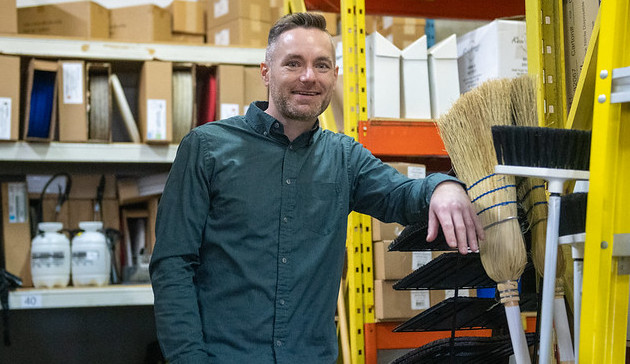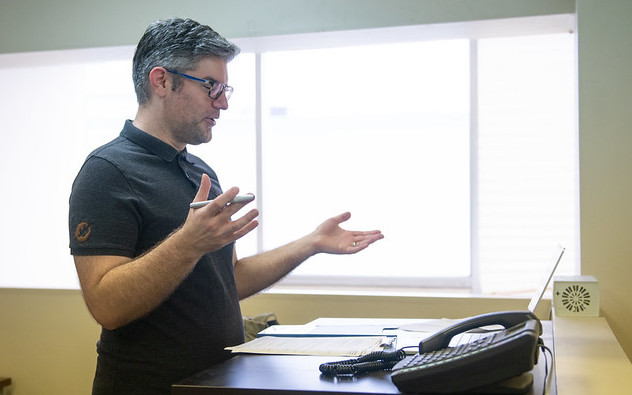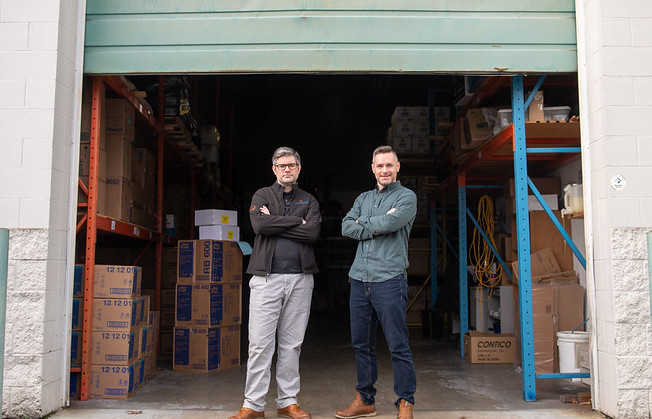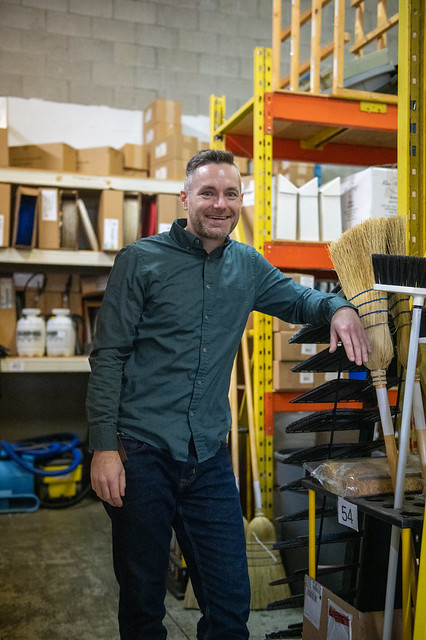As the pandemic stalled hands-on learning, the Shepit brothers took cleaning online
 Mop some floors, scrub some toilets.
Mop some floors, scrub some toilets.
Cleaning work is sometimes dismissed as menial.
The Shepit brothers, Dean and Darin, are used to the misconceptions. Together, they have a combined 45 years of experience in the cleaning business — both on the sales and the education sides. Through the Building Services Worker program at UFV, they are not only challenging inaccurate stereotypes about their industry, but also are reinventing how cleaning is taught.
“Our job as educators is to empower people to make purposeful changes in their facilities,” says Dean, who is also the owner of Clean Answers, a cleaning products supplier in Abbotsford.
The cleaning industry is a multi-billion dollar industry. Companies and organizations of all sizes have to consider safety, worker efficiencies, labour costs, products, and sustainability. Aspiring custodians, cleaning businesses and building operations managers for organizations such as the Correctional Services of Canada, Rogers Arena, and large scale commercial buildings have relied on the Shepit’s Building Service Worker Training to ensure access to up-to-date knowledge and best practices for cleaning staff.
“From an educational perspective, we want to help janitors learn how to clean the right way, be safe, and keep others safe,” says Darin. “In our courses, we talk about pathogens, bacteria transfer, and cross-contamination. Even with COVID — we updated part of our program to discuss the new standards of commercial building cleaning.”
 With public health at the forefront as a result of the global pandemic, many aspects of in-person interaction have been heavily impacted including how teachers educate. For programs within the trades, which rely on hands-on learning, the transition was tricky.
With public health at the forefront as a result of the global pandemic, many aspects of in-person interaction have been heavily impacted including how teachers educate. For programs within the trades, which rely on hands-on learning, the transition was tricky.
“We’ve always taught our cleaning courses in person,” says Anna Mayo, program coordinator for Industry Services and Part-time Trades at UFV. “Trades overall struggled because how do you teach technical skills online? You can’t teach welding online.”
However, Dean and Darin (who have been part-time UFV instructors since 2015) created a remote model that they believe provides the same knowledge base and adds an interactive experience that allows learning to be flexible.
“We often get criticism from our competitors that cleaning can’t be taught online,” Mayo says. “However, Dean and Darin are experts in their field and have developed, in our opinion, one of the best programs in the industry. It is attracting students all over the province — especially remote communities — who can now access training that previously they could not.”
The notion that students need to see up close how to learn the fundamentals and ideologies of cleaning is false, according to Dean.
“I can’t just have somebody shadow me with a dust mop and a bowl cleaner and hope that they’re going to understand the pH balance and chemicals,” he says. “There’s just too much information, and we are able to give a more comprehensive path for learning online.”
 The brothers grew up in the industry, cleaning commercial buildings before they could fill out T4 slips. Their father, Dennis, owned a janitorial supply business and eventually became an instructor in UFV’s Building Service Worker program. In 2012, Dennis authored, The Building Service Worker Handbook: Principles of Green Cleaning, which has gone through several editions and become the standard reference text for modern cleaning.
The brothers grew up in the industry, cleaning commercial buildings before they could fill out T4 slips. Their father, Dennis, owned a janitorial supply business and eventually became an instructor in UFV’s Building Service Worker program. In 2012, Dennis authored, The Building Service Worker Handbook: Principles of Green Cleaning, which has gone through several editions and become the standard reference text for modern cleaning.
“He always had a desire to be on the forefront of different technology from researching new equipment that was more eco-friendly to implementing a website for business and education in the ‘90s — which was unheard of at the time,” says Darin, noting his father retired from teaching in 2016, working part-time as a consultant.
As both brothers followed their father’s teaching footsteps the past half-decade, they have continued to implement Dennis’ principles, as well as continue to add on and adapt to greener, safer and business efficient solutions in their online courses. They preach the 4Ps:
People: “Keeping people healthy and safe is a huge component when talking about high -touch zone cleaning”
Planet: “Choosing the products and practices that have the least environmental impact.”
Profit: “90% of every dollar is spent on labour in our field, so we look for any way we can reduce those costs and bring efficiencies.”
Property: “How long can we maintain the quality and longevity of surfaces or other property so that we aren’t filling landfills unnecessarily?”
The brothers say that moving the course online has enabled them to fit more information into the course and expand their reach of students with the flexible schedule and eliminating the option to just locals. The ability to add video tutorials and other learning tools have added to the student experience, the brothers say. And, feedback through surveys to their online model has been overwhelmingly positive.
“The marks haven’t changed,” says Dean, “they’ve been just as good since we’ve been doing it.”
As the world slowly resumes back to the traditional in-person learning model, the Shepit brothers envision continuing the online model or perhaps creating a hybrid one. Whatever challenges their industry faces in the coming years, you can bet on Dean and Darin to always be ready to adapt just like their family business has done for decades.
“Even with robots coming into play, there’s always going to be people to run those robots and to clean different surfaces that robots can’t get,” says Dean. “So, we think that we’ve got a unique opportunity where we’ll just continue to grow and we’ll continue to learn and we’ll continue to make sure our students are exceeding the industry standard.”





